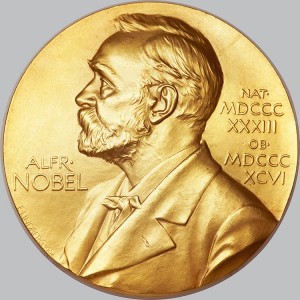Nobel Prize in Physics
October 4, 2017
Yesterday, October 3, the Royal Swedish Academy of Sciences in Stockholm, Sweden, awarded the 2017 Nobel Prize in physics to three American scientists. Rainer Weiss of the Massachusetts Institute of Technology (MIT) shared the prize with Barry Barish and Kip Thorne of the California Institute of Technology (Caltech) for their work on the Laser Interferometer Gravitational Wave Observatory (LIGO) experiment that led to the discovery of gravitational waves.
The existence of gravitational waves was predicted in 1915 by the German-born American physicist Albert Einstein’s general theory of relativity. A gravitational wave is a type of radiation that carries gravitational force. Scientists think that violent cosmic events create powerful gravitational waves. The waves, however, are difficult to detect because they grow weaker as they travel outward from their source. Researchers expect the waves that reach Earth to be very weak. The strongest waves might change the separation between two balls 0.6 mile (1 kilometer) apart by less than a thousandth of the diameter of the nucleus of an atom. Detecting such waves presented a significant challenge in physics.
Over years of research and collaboration, Thorne made important predictions of what the detection of gravitational waves would actually look like and how to identify them. He and Weiss helped develop plans to build large interferometers, devices that use light waves or other waves to make precise measurements, that could detect gravitational waves from cosmic sources. These sources include such violent cosmic events as collisions between black holes and neutron stars, the smallest and densest type of star known. Barish is widely credited for overseeing LIGO from its construction in 1999 to its first measurements in 2002. In 2016, LIGO scientists announced that they had detected gravitational waves coming from two colliding black holes. The gravitational waves had been detected by LIGO on Sept. 14, 2015. Since then, gravitational waves have been detected three more times.
Rainer Weiss was born on Sept. 29, 1932, in Berlin, Germany. He immigrated to the United States in 1938, and he earned a Ph.D. degree from MIT in 1962. Kip S. Thorne was born on Jun. 1, 1940, in Logan, Utah. He studied physics at Caltech and received his Ph.D. degree at Princeton University in New Jersey in 1965. Barry C. Barish was born on Jan. 27, 1936, in Omaha, Nebraska. He studied physics at the University of California at Berkeley, where he received his Ph.D. degree in 1962.



